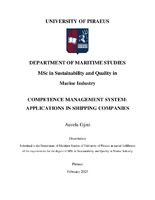| dc.contributor.advisor | Chatzinikolaou, Stefanos | |
| dc.contributor.advisor | Χατζηνικολάου, Στέφανος | |
| dc.contributor.author | Gjini, Aurela | |
| dc.contributor.author | Γκίνι, Αουρέλα | |
| dc.date.accessioned | 2025-03-12T07:05:49Z | |
| dc.date.available | 2025-03-12T07:05:49Z | |
| dc.date.issued | 2025-02 | |
| dc.identifier.uri | https://dione.lib.unipi.gr/xmlui/handle/unipi/17545 | |
| dc.description.abstract | Ο κύριος σκοπός αυτής της εργασίας είναι η ανάλυση των Συστημάτων Διαχείρησης Επάρκειας Προσόντων, η συστηματική ανάπτυξη τους και εφαρμογή τους για παραπάνω απο τέσσερις δεκαετίες στα Τμήματα Ανθρώπινου Δυναμικού των Εταιρειών, και πιο συγκεκριμένα η εφορμογή τους στις Ναυτιλιακές εταιρείες, τόσο στο προσωπικό γραφείου όσο και στα πληρώματα.
Η εργασία αυτή επιχειρεί να μελετήσει την εξέλιξη των συστημάτων αυτών στις Ναυτιλιακές εταιρείες μέσα από τις απαιτήσεις της Διεθνής Σύμβασης για τα Πρότυπα Πιστοποιητικών Εκπαιδεύσεως και Τηρήσεως Φυλακών των Ναυτικών (STCW) λαμβάνοντας υπόψη τις τεχνικές ικανότητες που θα πρέπει να κατέχουν οι ναυτικοί ανάλογα με θέση τους. Πέρα όμως από τις τεχνικές δεξιότητες των ναυτικών παραθέτονται και μη τεχνικές δεξιότητες με βάση τις απαιτήσεις Διαχείρησης και Αυτοαξιολόγησης Δεξαμενόπλοιων 3 (TMSA 3), γνωστές και ως οριζόντιες ή «μαλακές» δεξιότητες, οι οποίες παίζουν καθοριστικό ρόλο στην ασφαλή και αποτελεσματική λειτουργία των δεξαμενόπλοιων.
Επιπλέον, γίνεται αναφορά στις μεθόδους αξιολόγησης ικανότητας με βάση την αξιολόγηση συμπεριφοράς που προτείνεται από το Διεθνές ναυτιλιακό φόρουμ Εταιρειών Πετρελαίου (μια εθελοντική ένωση εταιρειών πετρελαίου που ενδιαφέρονται για την αποστολή και τερματισμό αργού πετρελαίου, προϊόντων πετρελαίου κ.α. γνωστή με το ακρωνύμιο OCIMF) και την Διεθνής Ένωση Πλοιοκτητών Δεξαμενοπλοίων (INTERTANKO).
Τέλος, με βάση όλα τα παραπάνω προτείνονται τρόποι για την πετυχημένη εφαρμογή των Συστημάτων Διαχείρησης Επάρκειας Προσόντων, αναφέρονται οι στόχοι του συστήματος, η εφαρμογή τους (πόροι, προσδιορισμός δεξιοτήτων, εργαλεία, αξιολογήσεις), η παρακολούθηση και βελτίωση των συστημάτων αυτών καθώς και η ενσωμάτωση τους σε ήδη υπάρχοντα συστήματα. | el |
| dc.format.extent | 48 | el |
| dc.language.iso | en | el |
| dc.publisher | Πανεπιστήμιο Πειραιώς | el |
| dc.rights | Αναφορά Δημιουργού-Μη Εμπορική Χρήση-Όχι Παράγωγα Έργα 3.0 Ελλάδα | * |
| dc.rights | Αναφορά Δημιουργού-Μη Εμπορική Χρήση-Όχι Παράγωγα Έργα 3.0 Ελλάδα | * |
| dc.rights | Αναφορά Δημιουργού-Μη Εμπορική Χρήση-Όχι Παράγωγα Έργα 3.0 Ελλάδα | * |
| dc.rights.uri | http://creativecommons.org/licenses/by-nc-nd/3.0/gr/ | * |
| dc.title | Competence management system : applications in shipping companies | el |
| dc.type | Master Thesis | el |
| dc.contributor.department | Σχολή Ναυτιλίας και Βιομηχανίας. Τμήμα Ναυτιλιακών Σπουδών | el |
| dc.description.abstractEN | The main purpose of this thesis is to analyze how Competency Management Systems work, their systematic development and their application for more than four decades in the Human Resources Departments of the Companies, and more specifically their application in the Shipping Companies, both for their ashore staff and also on board crew.
This thesis attempts to study the application of these systems in Shipping Companies through the requirements of the International Convention on Standards of Training, Certification and Watchkeeping for Seafarers (STCW), taking into account the technical skills that seafarers should have according to their rank. However, in addition to the technical skills of seafarers, non-technical skills, also known as “soft skills” are being studied based on the requirements of Tanker Management and Self-Assessment 3 (TMSA 3), which play a decisive role in the safety and efficiency of operations of tankers vessels.
In addition, reference is made to assessment methods for competence and the behavioral assessment proposed by Oil Companies International Marine Forum (OCIMF) and the International Association of Tanker Owners (INTERTANKO).
Lastly, based on all of the above, ways are proposed for the successful implementation of Competence Management Systems (CMS), the objectives of these systems, their implementation (resources, skills identification, tools, and evaluations), the monitoring and improvement of them, as well as the integrating them into already existing systems. | el |
| dc.contributor.master | Βιωσιμότητα και Ποιότητα στη Θαλάσσια Βιομηχανία | el |
| dc.subject.keyword | Competency management system | el |
| dc.subject.keyword | Shipping | el |
| dc.subject.keyword | Human resources | el |
| dc.subject.keyword | Crew | el |
| dc.subject.keyword | International Maritime Organization | el |
| dc.subject.keyword | IMO | el |
| dc.subject.keyword | Technical skills | el |
| dc.subject.keyword | Soft skills | el |
| dc.subject.keyword | Tanker | el |
| dc.subject.keyword | Tanker Management and Self-Assessment 3 (TMSA 3) | el |
| dc.subject.keyword | Oil Companies International Marine Forum (OCIMF) | el |
| dc.subject.keyword | International Association of Tanker Owners (INTERTANKO) | el |
| dc.date.defense | 2025-02-03 | |



